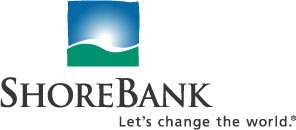 | |
| Company type | Community development bank |
|---|---|
| Founded | 1973 |
| Defunct | 2010 |
| Fate | Insolvency |
| Successor | Urban Partnership Bank |
| Headquarters | Chicago, Illinois |
Key people |
|
| Products | Financial services, microfinance |
| Total assets | $2.6B USD (2008) |
| Parent | ShoreBank Corporation |
| Website | SBK.com (Archive.org) |
ShoreBank was a community development bank founded and headquartered in Chicago. At the time of its closing it was the oldest and largest such institution, and in 2008 had $2.6 billion in assets.[1] It was owned by ShoreBank Corporation, a regulated bank holding company.
ShoreBank had branches in Chicago's South and West sides, Cleveland, and Detroit. Between 2000 and 2006, ShoreBank issued nearly $900 million in loans to citizens in Chicago, Detroit, and Cleveland.[2] ShoreBank and its affiliated companies had projects in 30 countries.[3]
ShoreBank incorporated environmental conservation into its mission during the 1990s, helping develop a triple bottom line approach to banking, equally prioritizing profits, impact on people, and the impact of a project on the environment.[4] At that time it established ShoreBank Pacific based in Portland, Oregon.
ShoreBank accepted mission-based deposits from across the country through its Development Deposits program, launched in 1982, and its online savings account ShoreBank Direct, launched in 2007.[5]
Although mission-based, the bank's financial performance historically matched or exceeded that of its peer banks.[6] However, the bank faced significant losses in 2009,[7] and as of May 2010, was seeking $200 million in additional capital from major investors and the U.S. government. The bank's losses were related to the recession, though it was not engaged in subprime lending.[8] In the spring of 2010, ShoreBank raised over $150MM in private equity to recapitalize the bank. However, no action was taken on its application for $70MM in Troubled Asset Relief Program funds which it was fully eligible to receive. The combination would have been enough to allow the bank time to work through its troubled loan portfolio.
ShoreBank Corporation was the first bank holding company to combine commercial banking, real estate development, nonprofit loan funds, and international advisory services aimed at community development. Originally developed as a neighborhood development bank for low-income African-American communities, ShoreBank eventually expanded nationally and internationally.
It exceeded its goal of private capital commitments but did not receive requested government support, a condition of the private investors. In August 2010, the bank faced possible insolvency and risked having its deposits taken over by the Federal Deposit Insurance Corporation, which insured its deposits.[9] On August 20, 2010, the bank was declared insolvent, closed by regulators and most of its assets were acquired by Urban Partnership Bank.[10] Some of the more recent management hirees of ShoreBank, in an unprecedented move by the FDIC, were allowed to continue to run the restructured bank, now a part of Urban Partnership Bank.[11] According to the FDIC, the recent hirees "did not contribute to the bank's problems."[12][13] Sheila Bair, head of the U.S. Federal Deposit Insurance Corporation, devoted several pages to the lack of federal support in her 2012 book and commented that the FDIC sought approval of the injection of federal funds several times, to no avail.[14]
- ^ Annual Reports. Archived 2016-11-16 at the Wayback Machine ShoreBank.
- ^ Rafter, Dan. "Uncommon Vision Archived 2006-11-15 at archive.today", "Motto". Retrieved on January 9, 2007
- ^ Developing International Economies. ShoreBank Corporation.
- ^ Iowa State University. "Investing for Triple Bottom Line Returns", 2006-6-1. Retrieved on January 8, 2007
- ^ Carpenter, Dave. 'Bank with a heart' thrives despite predictions of failure. Archived 2012-07-21 at archive.today Savannah Morning News. 11 June 2007.
- ^ Marshall, Katherine. "ShoreBank gauges success by profit and community impact" Archived 2007-10-12 at the Wayback Machine, Medill News Service, Northwestern University, May 17, 2005, retrieved September 19, 2007
- ^ Daniels, Steve (April 2, 2010). "ShoreBank sees another $101M loss just ahead". Crain's Chicago Business.
- ^ Williamson, Elizabeth & John D. McKinnon (May 15, 2010). "Bank Rescue Down to Wire". The Wall Street Journal.
- ^ Roeder, David (2010-08-06). "ShoreBank on the brink". Chicago Sun-Times. Archived from the original on 2010-08-20. Retrieved 2010-08-06.
- ^ Selyukh, Alina (2010-08-20). "Regulators Close Chicago's ShoreBank". ABC News. Retrieved 2010-08-20.
- ^ Guy, Sandra (August 21, 2010). "Feds seize ShoreBank, new management named". Chicago Sun-Times. Archived from the original on August 22, 2010.
- ^ Gordon, Marcy (August 20, 2010). "Regulators shut down big Chicago bank, 7 others". Yahoo! News. The Associated Press. Archived from the original on August 22, 2010. Retrieved 21 August 2010.
- ^ J.E. Post and Fiona Wilson, Too Good To Fail, Stanford Social Innovation Review, Fall, 2011, [1]
- ^ "Bull by the Horns: Fighting to Save Main Street from Wall Street and Wall Street from Itself," by Sheila Bair, Free Press, 2012.